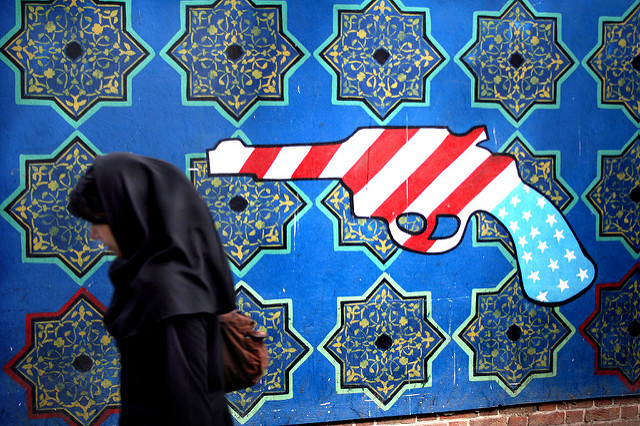Australia should continue to support the Iran nuclear deal

Australia has long pursued nuanced foreign policy approaches to both nuclear non-proliferation and its bilateral relationship with Iran, and has clearly benefitted from full diplomatic relations and a favourable trade relationship with Tehran.
We rightfully lent our support to the 2015 Joint Comprehensive Plan of Action on Iran’s nuclear program. It still represents the best available option for limiting Iran’s nuclear activities and building confidence within the international community on the vexed question of Iran’s nuclear ambitions.
By drastically reducing Iran’s stockpile of enriched uranium and number of operating centrifuges, while also expanding the scope for IAEA safeguards inspections under an additional protocol, the deal makes it much harder for Iran to realise a nuclear breakout capability undetected.
While Australia played no formal role in the development and implementation of this agreement, it advanced many of Australia’s strategic objectives with regard to nuclear non-proliferation and Middle East engagement. The agreement provided a clear pathway to resolving one of the more problematic nuclear issues facing the IAEA Board of Governors—of which Australia is a permanent member. It also provided space to enhance bilateral relations and trade with Iran at a time when a relatively moderate government was in power in Tehran.
Foreign Minister Julie Bishop took advantage of the opportunity provided by the signing of the JCPA to visit Iran in 2015 to build an enhanced bilateral relationship—a relationship that traditionally has been focused on trade, but has now expanded to include cooperation on illegal immigration and talks on security and terrorism, which are high priorities for the Australian Government.
But the Iran deal is now under threat from Israel’s Prime Minister Benjamin Netanyahu and US President Trump, both of whom appear to be taking concrete steps to undermine it.
Netanyahu raised the deal—and his vehement opposition to it—during his recent visit to Australia. Israeli media noted that Netanyahu during his visit ‘explained the substantial dangers of the nuclear agreement and in Iran’s aggressive conduct in the region’. Netanyahu delivered a similar message to UK Prime Minister Theresa May in early February, suggesting he is trying to build support for Israel’s opposition to the agreement.
Netanyahu also made clear during a CBS interview in early December 2016 that there were ‘various ways of undoing’ the deal, and that he had ‘five things’ in mind—he implied that he would discuss his plan with US President Trump.
Donald Trump, likewise, has made clear his opposition to the Iran deal, both during his election campaign and also in the lead up to and following his inauguration. Trump has stated that his ‘number one priority is to dismantle the disastrous deal with Iran’, and has also identified Iran as the world’s biggest sponsor of terrorism. Trump raised the Iran deal with a visiting Iraqi delegation on 20 March 2017, saying that ‘nobody’ can figure out why President Barack Obama signed a nuclear agreement with Iran. And although Trump’s senior advisor on counter proliferation, Christopher Ford, has since said that the US will adhere to the Iran nuclear deal ‘until otherwise decided’, Ford also said that the US is reviewing the Iran deal along with along with all the other nuclear arms agreements. Trump’s and Netanyahu’s views on the Iran deal stand starkly at odds with the balance of expert opinion in the non-proliferation community.
Despite the risk of Trump acting unilaterally to withdraw from the agreement, it is more likely that both Israel and the US—through diplomacy and the selective sharing of intelligence on Iran’s nuclear-related activities—will seek to gain support for their objectives.
Australia remains particularly vulnerable to both the US and Israel using leverage to gain support for their plans to undermine the agreement. Netanyahu’s visit to Australia focused on increased cooperation on security and terrorism—on which Israel would bring more to the table. Similarly, the US also holds the upper hand in cooperation on military, terrorism, intelligence and cyber security matters. Should Trump and Netanyahu make security cooperation transactional, they may demand support from Australia for their objectives on Iran.
Additionally, vocal and influential members of the Israel lobby, conservative media and members of parliament on both sides of government in Australia have made clear their opposition to the Iran deal since its inception and they have jumped at opportunities to highlight supposed transgressions by Iran. A shuffling of federal ministerial responsibilities could see increased alignment of Australian policy with Trump and Netanyahu’s positions on the deal.
Should Israel and the US succeed in undermining the agreement, it would be a disaster for stability in the Middle East, and for Australia’s interests in the region and globally. Repudiation of the agreement would embolden hardliners in Iran opposed to the deal. It would make any future deals untenable and increase the prospects for Iran pursuing a nuclear weapons capability. It would also likely see Iranian and pro-Iranian forces in Iraq and Syria become more overtly hostile towards coalition—including Australian—forces in the region, further reducing the prospects for stability in Iraq and Syria.
Australia—and arguably the US—need Iran as a partner in the Middle East, not as an enemy. Despite the rocky start to Australia’s relationship with the Trump Administration, Australia should look to leverage our long record of support for US foreign policy to persuade Trump to see the value of the Iran deal—before it is too late.

